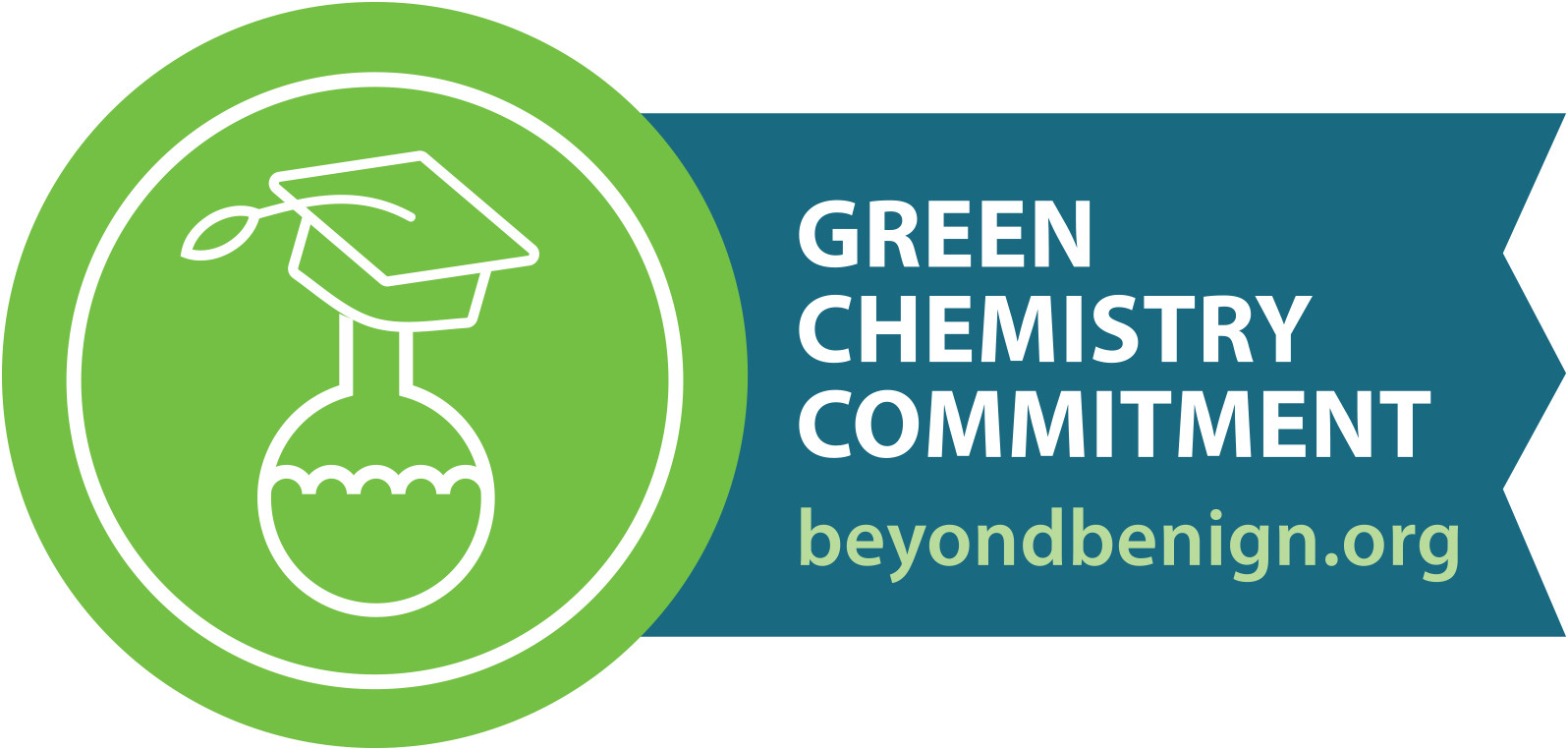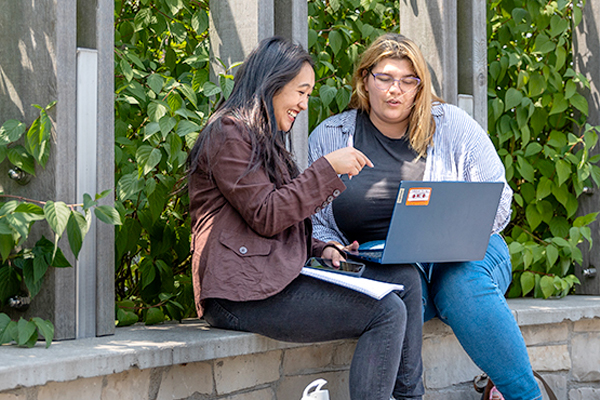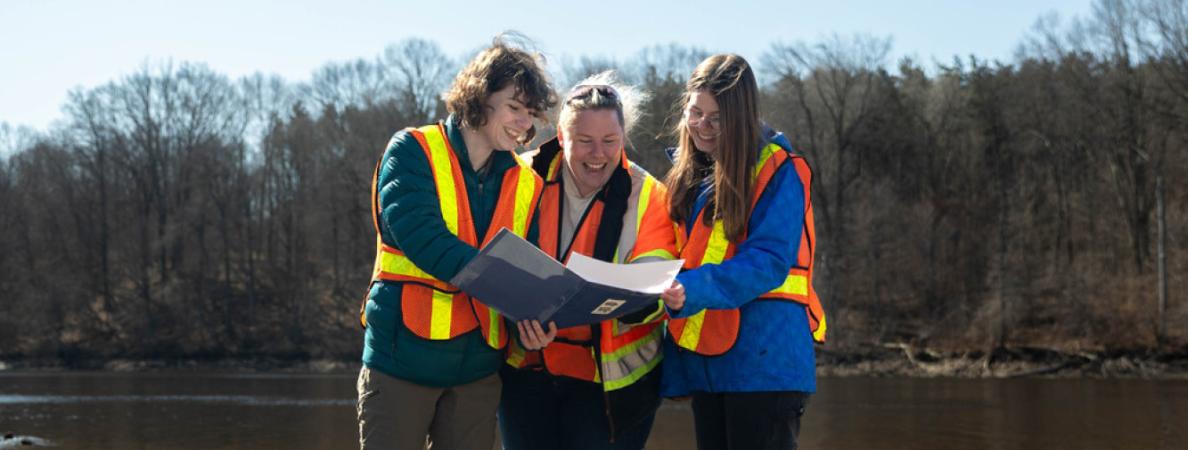Environmental Technician
453 - 463
Program Highlights
- Learn from professional faculty experts using state-of-the-art lab equipment and facilities
- High graduate and co-op placement rates, supported by our excellent reputation among environmental stakeholders and government agencies
- Engage in zero waste lab initiatives and our Green Chemistry Commitment through our partnership with Beyond Benign
- Program-wide engagement with Indigenous content and knowledge across several courses
- Students may be eligible for Ministry of Environment Entry Level Drinking Water Certificate upon successful completion of Water Treatment Technology Course
- Opportunity to write Ministry of Environment Water and Wastewater Treatment Operator-in-Training Certification exams on campus.
- Participate in Capstone projects with community partners to create meaningful real-world impact!
What you'll learn
- Principles of climate change, sustainability, and pollutant impacts on health and the environment
- Knowledge needed to prepare for Water and Wastewater Treatment Operator-in-Training Certification exams offered by the Ministry of Environment
- Standardized analytical methods for analyzing air, water and soil samples including quality assessment and control protocols
- Brownfield remediation methods, including site assessment, monitoring, mitigation and remediation
- Air pollution monitoring and control
- Geographic Information Systems (GIS), remote sensing, and UAV (drones) technology

Program Length
2 academic years (periods of 8 months), plus optional co-op
Course Overview & Descriptions
Click on the course title for a course description.
Learning Outcomes
Program Learning Outcomes, often referred to as ‘Program Standards', set out the essential learning that a student must achieve before being deemed ready to graduate.
- Review the program learning outcomes for Environmental Technician (453)
- Review the program learning outcomes for Environmental Technician (463) - co-op
In many cases these program learning outcomes were developed by the Ministry of Colleges and Universities (MCU) in consultation with employers and educators who are experts in the program field. To ensure the outcomes remain current and in line with industry needs, we invite our employers, graduates working in the field and current students to re-examine and update them during regular, ongoing program review focus groups.
Admission
Domestic and International student admission requirements
OSSD or equivalent (Mohawk Academic Upgrading, GED) including:
- Grade 12 English, C or U or equivalent
- Grade 12 Mathematics, MAP4C ≥ 60%; or MCT4C; or any U or equivalent
Options are available for mature applicants.
Don't have the necessary requirements?
Language Requirements for Applicants with English as a Second Language
- See below for accepted equivalents for Grade 12 English:
- Successful completion of the GAS-English for Academic Purposes (478) program
- TOEFL minimum score of 550 (80 Internet based)
- or IELTS Academic minimum score of 6.0 overall with no band less than 5.5
- More information about acceptable certificates, can be found on the International Admission Requirements
Tuition and Fees
2025 - 2026 Domestic Tuition and Fees
| Description | Semester 1 | Semester 2 |
|---|---|---|
| Compulsory Ancillary Fees | $907.11 | $809.78 |
| Compulsory Program Fees | $0.00 | $0.00 |
| Domestic Tuition | $1,354.04 | $1,354.04 |
| Co-op Fees | N/A | $475.00 |
| Total Domestic Charges Per Semester without Co-op | $2,261.15 | $2,163.82 |
| Total Domestic Charges Per Semester with Co-op | $2,261.15 | $2,638.82 |
| Total 1st Year Fees (Non Co-op) | $4,424.97 | |
| Total 1st Year Fees (Co-op) | $4,899.97 | |
Above fees based on full-time September program start date. Contact Student Services to confirm fees for other start dates or semesters.
- Full Cost Breakdown
- Explore payment options
- Book costs for your program can be found through the Campus Store
- You will also be required to purchase safety equipment, tools/supplies and/or exam fees. Full details will be provided in your classes or at your orientation. This is an additional cost (above tuition/ancillary fees and textbooks).
2025 - 2026 International Tuition and Fees
| Description | Semester 1 | Semester 2 |
|---|---|---|
| Total Tuition & Ancillary Fee | $8,890.00 | $8,890.00 |
| Program Compulsory Fee Plus Tax | $0.00 | $0.00 |
| International Tax Recovery | $450.00 | $375.00 |
| Co-op Fees | N/A | $475.00 |
| Total International Charges Per Semester without Co-op | $9,340.00 | $9,265.00 |
| Total International Charges Per Semester with Co-op | $9,340.00 | $9,740.00 |
| Total 1st Year Fees (Non Co-op) | $18,605.00 | |
| Total 1st Year Fees (Co-op) | $19,080.00 | |
If you pay by wire transfer, please note your bank might charge you a fee to transfer money. Make sure your transfer includes the Mohawk payment and the wire transfer fee. This applies to each wire transfer payment you make.
- Explore payment options
- Book costs for your program can be found through the Campus Store
- You will also be required to purchase safety equipment, tools/supplies and/or exam fees. Full details will be provided in your classes or at your orientation. This is an additional cost (above tuition/ancillary fees and textbooks).
Additional Information
Financial Assistance
When it comes to paying for your education, investing in your future can be more affordable than you think. A Mohawk education is one of the most cost-effective means of acquiring the skills and knowledge you need to have a prosperous and rewarding career.
As you start on your chosen career path, it's important to have a realistic set of expectations regarding the expenses associated with attending college. In addition to your tuition fees, you will also need to budget for books, supplies, housing, and other related living expenses. You may be able to supplement your income and savings with scholarships, bursaries, or loans. It pays to do some research into what types of financial assistance you may qualify for.
Available Financial Assistance Resources:
 OSAP Eligible. Learn about Ontario Student Assistance Program - OSAP (domestic students only)
OSAP Eligible. Learn about Ontario Student Assistance Program - OSAP (domestic students only)- Working on Campus
- Additional Sources of Funding
- Financial Assistance Home Page
Apply for Awards:
By submitting a Scholarships and Bursaries Application every semester, students have access to over $3 million in Mohawk College scholarships, bursaries and Ministry-partnered funding to help meet their financial needs.
Financial Literacy:
Whether saving for school, sticking to a budget, or planning for a major purchase, financial literacy affects us all. That's why Mohawk College is dedicated to helping students improve their financial literacy and become more confident in managing their money.
- Complete the free online Money Matters Module to earn Co-Curricular Credit!
- Financial Resources and Calculators
Experiential Learning
How you’ll gain skills
- Through practical, hands-on laboratory experience using state-of-the-art equipment.
- Completing collaborative capstone projects in conjunction with industry partners.
- Gain valuable experience during co-op work terms.
- Optional multi-day “Operation of Conventional Treatment Processes” course offered at the Walkerton Clean Water Centre in Walkerton, Ontario. Participating students will operate, monitor, and troubleshoot a pilot conventional drinking water treatment plant.
- Optional field trips to relevant industrial and municipal facilities.
This co-op program has been accredited by CEWIL Canada. This represents the highest standard of achievement for co-op programs in Canada.
To learn more, please visit the Centre for Experiential Learning.
Co-op Format (Fall Intake)
| September to December | January to April | May to August |
|---|---|---|
| Semester 1 | Semester 2 | Vacation |
| Semester 3 | Work Term 1 (Co-op) | Work Term 2 (Co-op) |
| Work Term 3 (Co-op) | Semester 4 |
Co-op Format (Winter Intake)
| January to April | May to August | September to December |
|---|---|---|
| Semester 1 | Semester 2 | Semester 3 |
| Work Term 1 (Co-op) | Work Term 2 (Co-op) | Work Term 3 (Co-op) |
| Semester 4 |
Learn more about Environmental Technician
Co-op Delivery and Fees
This program has an optional co-op, as part of the program of study. The annual co-op fee structure can be found on the Tuition and Fees page.
For questions, please contact the Co-op Specialist listed at the bottom of the webpage.
Driver’s License and Vehicle
Please note that the majority of co-op positions for this program require that students have a valid driver’s license ('G' class preferred) and access to a vehicle.
Co-op Designation
This program offers three co-op work term opportunities but requires two completed co-op work terms for the co-op designation.
Work Term Capabilities
(which do not reflect individual work experiences & exposures)
Classroom instruction, combined with hands-on laboratory experience, have provided the student with sufficient knowledge to perform tasks in the following areas:
- Basic lab skills including balance use, solution preparation, and titrimetric analysis
- Use, maintenance, and calibration of laboratory and field equipment
- UV/Vis spectrophotometry, gravimetric methods, and auto-titration
- Drinking water and wastewater analysis, including BOD/COD, turbidity, pH, and sample collection
- Air and noise monitoring, occupational hygiene, and safety practices
- Environmental compliance, risk assessment, and solid waste analysis
- Experience with Microsoft Office, Excel macros, and introductory VBA programming
- Geographic Information Systems (GIS) and GPS data collection
- Exposure to ISO 14000 concepts and sustainability initiatives
- PC-based data acquisition, statistical analysis, and sensor interfacing
| Co-op Pay Range | Co-op Pay Average |
|---|---|
| Range: $17.60 - $24.00 | Average: $20.00 |
For further information, please contact:
Blair Goodman, Co-op Specialist
Phone: 905-575-2168
Email: blair.goodman [at] mohawkcollege.ca (Blair Goodman)
Educational Pathways
Pathways to Mohawk
If you've successfully taken a course at another post-secondary institution, you may be able to earn course exemptions toward your credential here at Mohawk.
If you have successfully completed one of the following programs at Mohawk, you may be eligible to receive transfer credit in this program. To start a new program at Mohawk, you must apply via ontariocolleges.ca.
Transfer from
You can transfer to the Environmental Technician - 453 - 463 from the following programs:
Pre-Technology
Receiving Program
Environmental Technician
Transfer to
You can transfer from the Environmental Technician - 453 - 463 to the following programs:
Bachelor of Management - Sustainability
Honours Bachelor of Management - Sustainability
Bachelor of Technology - Sustainability
Honours Bachelor of Technology - Sustainability
Credit transfer agreements have been arranged to make it easier for students to move from Mohawk to another institution.
Transfer From Environmental Technician To
Western University
1151 Richmond Street
London ON N6A 3K7
Canada
Environmental Science
1151 Richmond Street
London ON N6A 3K7
Canada
Mohawk College makes every effort to ensure the accuracy of each transfer opportunity. Please note that changes may occur in program offerings, admission requirements, and transfer credits granted by the receiving institutions. We advise all students to check with the receiving institution directly for the most up-to-date information.
Don’t see what you’re looking for? Search ONTransfer.ca for more pathways with Ontario public colleges and universities.
Mohawk College makes no warranty or endorsement of material contained within links to external websites, nor does the College assume any responsibility for the linked website or its contents.
Additional Information
Cooperative Internship Option
Students interested in the cooperative internship do not apply directly. Once enrolled in program 453 students can select the cooperative internship option.
What is an OIT?
To work as a water or wastewater operator in Ontario, an OIT is the first step in certification. An OIT is an operator-in-training license. There are 4 OIT licenses available from the Ontario Water Wastewater Certification Office (OWWCO): water treatment, water distribution, wastewater treatment, wastewater collection. For students and graduates to find work in this sector, an OIT license is a job requirement.
In semester 3, Environmental Technician students will learn important concepts related to water and wastewater treatment required to successfully complete their OIT exams. Based on interest, students may also have the opportunity to take the certification exams on campus. There is an additional fee for students who wish to write the exams and purchase the OIT study manual.
What is an Entry Level Drinking Water Certificate?
The Entry Level Drinking Water Certificate is obtained by completing the OWWCO entry level course (ELC). This course is a combination of self-study and in-class work followed by a comprehensive exam. Successful completion of the ELC is needed to renew a drinking water Operator-in-Training certificate or obtain a Class 1 drinking water certificate.
As part of the Environmental Technician at Mohawk, students may be eligible to receive the Entry Level Drinking Water Certificate at no additional cost as part of the Water Treatment Technology Course (STENCY501) offered in semester 3. Eligibility for the certificate will be determined based on attendance and grades.
What is OACETT?
OACETT is the Ontario Assocation of Certified Engineering Technicians and Technologists. Students in the Environmental Technician program are eligible to register as student members with OACETT. After completion of the program, graduates can apply as associate members and work towards the Certified Technician designation (C.Tech.) through OACETT. Further details regarding membership, certification and member benefits can be found at oacett.org.
Tech requirements
Students will need to have access to a computer with high speed internet connection and capability to run Microsoft 365 software.
Career Opportunities
Your future career options
- Environmental Inspectors and Auditors
- Environmental Laboratory and Field Technicians
- Technical Sales and Service Representatives
- Operators and Supervisors of Water and Wastewater Treatment Facilities
Where you could work includes:
- Municipal/Provincial/Federal Governments
- Environmental Consulting/Management Firms
- Water/Wastewater/Industrial Wastewater Treatment Operations
- Environmental and Chemical Laboratories
- Manufacturing and Energy Production
Opportunities for grads
- Graduates and final year students are eligible to be registered as associate members of the Ontario Association of Certified Engineering Technicians and Technologists (OACETT) upon submission of the Graduate Application form available through OACETT.
- Students successfully completing Water Treatment Technology STEN CY401 in semester 3 may be eligible for the Ministry of the Environment's Entry-Level Certificate for Drinking Water Operators
Meet our faculty
Ready to apply?
If you are a Domestic or Canadian applicant, you can apply through the Ontario College Application System.
You are considered a Domestic applicant if you are a Canadian citizen or a permanent resident that resides inside or outside of Canada.

Contact us
Domestic Canadian Students
Contact Student Recruitment
Haven’t applied yet and have questions?
Contact our Student Recruitment team for information on programs, how to apply, and more.
Contact Admissions
Contact our Admissions advisors for help with your application.
Email Admissions
Book an Appointment ⤻
Phone: 905-575-1212
International Students
Contact International Student Recruitment
Contact our International Student Recruitment team for information on programs, how to apply, and student life.
Contact International
Email: intl.representatives@mohawkcollege.ca
Phone: 1-905-575-2254
Toll free phone numbers:
For general questions: 1-888-Mohawk9 (1-888-664-2959)
Contact International Admissions
Contact our Admissions advisors for help with your application.
Contact International Admissions
Phone: 1-905-575-2254
*Not all programs are international eligible. Please see our programs available for international students.
Program Coordinator

Alysa De Bellis
Accessible Learning Services
Are you a student with a confirmed or suspected disability? Visit our Accessible Learning Services website to discover how we can help you.











